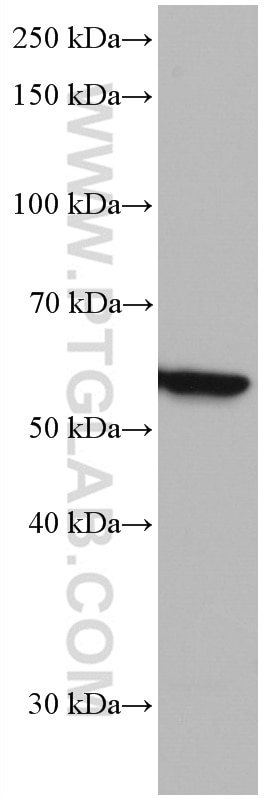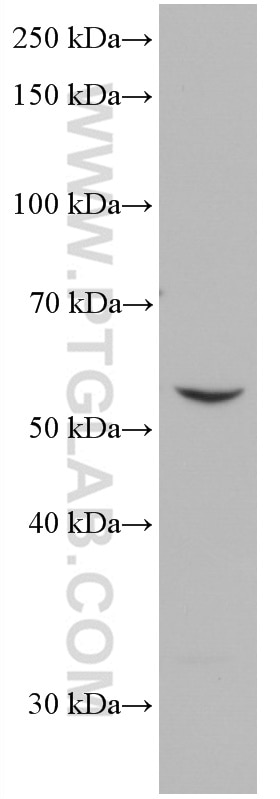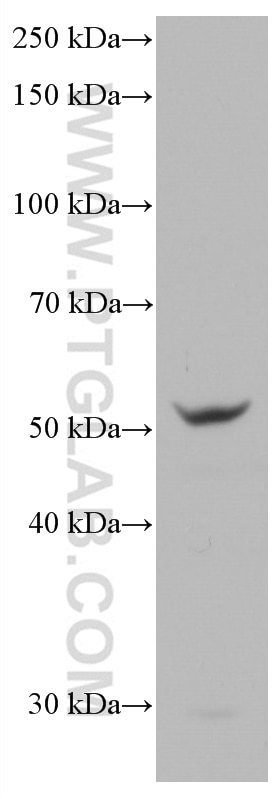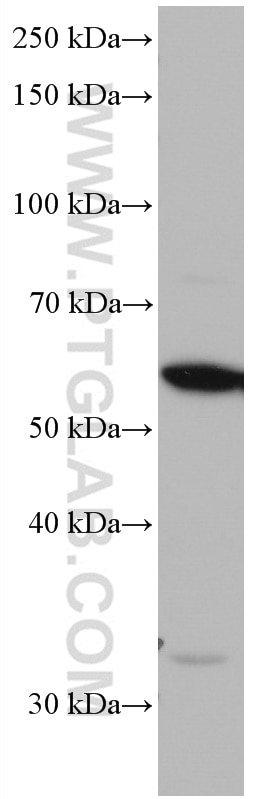Tested Applications
| Positive WB detected in | A549 cells, HeLa cells, THP-1 cells, RAW 264.7 cells |
Recommended dilution
| Application | Dilution |
|---|---|
| Western Blot (WB) | WB : 1:1000-1:6000 |
| It is recommended that this reagent should be titrated in each testing system to obtain optimal results. | |
| Sample-dependent, Check data in validation data gallery. | |
Product Information
66835-1-Ig targets IRF5 in WB, ELISA applications and shows reactivity with human, mouse samples.
| Tested Reactivity | human, mouse |
| Host / Isotype | Mouse / IgG1 |
| Class | Monoclonal |
| Type | Antibody |
| Immunogen |
CatNo: Ag5442 Product name: Recombinant human IRF5 protein Source: e coli.-derived, PET28a Tag: 6*His Domain: 173-498 aa of BC004201 Sequence: TLRPPTLQPPTLQPPVVLGPPAPDPSPLAPPPGNPAGFRELLSEVLEPGPLPASLPPAGEQLLPDLLISPHMLPLTDLEIKFQYRGRPPRALTISNPHGCRLFYSQLEATQEQVELFGPISLEQVRFPSPEDIPSDKQRFYTNQLLDVLDRGLILQLQGQDLYAIRLCQCKVFWSGPCASAHDSCPNPIQREVKTKLFSLEHFLNELILFQKGQTNTPPPFEIFFCFGEEWPDRKPREKKLITVQVVPVAARLLLEMFSGELSWSADSIRLQISNPDLKDRMVEQFKELHHIWQSQQRLQPVAQAPPGAGLGVGQGPWPMHPAGMQ Predict reactive species |
| Full Name | interferon regulatory factor 5 |
| Calculated Molecular Weight | 56 kDa |
| Observed Molecular Weight | 56 kDa |
| GenBank Accession Number | BC004201 |
| Gene Symbol | IRF5 |
| Gene ID (NCBI) | 3663 |
| RRID | AB_2882178 |
| Conjugate | Unconjugated |
| Form | Liquid |
| Purification Method | Protein G purification |
| UNIPROT ID | Q13568 |
| Storage Buffer | PBS with 0.02% sodium azide and 50% glycerol, pH 7.3. |
| Storage Conditions | Store at -20°C. Stable for one year after shipment. Aliquoting is unnecessary for -20oC storage. 20ul sizes contain 0.1% BSA. |
Background Information
IRF5, also named as SLEB10, contians one IRF tryptophan pentad repeat DNA-binding domain and belongs to the IRF family. It is a transcription factor involved in the induction of interferons IFNA and INFB and inflammatory cytokines upon virus infection. It is activated by TLR7 or TLR8 signaling. Genetic variations in IRF5 are associated with susceptibility to inflammatory bowel disease type 14 (IBD14) and systemic lupus erythematosus type 10 (SLEB10). IRF5 is also used as M1 marcrophage lineage marker. Alternative splice variant encoding different isoforms exist.
Protocols
| Product Specific Protocols | |
|---|---|
| WB protocol for IRF5 antibody 66835-1-Ig | Download protocol |
| Standard Protocols | |
|---|---|
| Click here to view our Standard Protocols |










